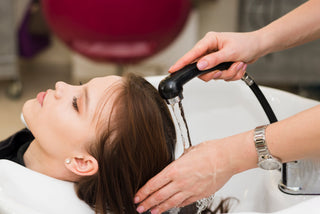Is Scalp Treatment Necessary?
When it comes to hair care, most of us focus on the hair itself—shampoos, conditioners, serums, and styling products often take center stage. But what about the scalp? This often-overlooked area plays a crucial role in the health and appearance of our hair. So, is scalp treatment necessary? Let’s explore the benefits of scalp care and why it might be the missing piece in your hair care routine.
1. Understanding the Scalp’s Role in Hair Health
The scalp is the foundation of hair health. Much like fertile soil is essential for growing healthy plants, a healthy scalp is crucial for strong, beautiful hair. The scalp is home to hair follicles, sebaceous glands, and a network of blood vessels that supply nutrients to the hair. Neglecting scalp care can lead to a range of issues that impact hair growth and quality.
2. Common Scalp Issues
a. Dry and Itchy Scalp
A dry, itchy scalp can be uncomfortable and embarrassing. It often leads to dandruff, which are visible flakes that can be particularly noticeable on dark clothing. Dryness can be caused by factors such as harsh shampoos, cold weather, and dehydration.
b. Oily Scalp
An oily scalp can make hair look greasy and flat. Overactive sebaceous glands produce excess oil, which can clog hair follicles and lead to scalp acne or other irritations. This can be exacerbated by improper washing or using the wrong hair products.
c. Scalp Infections
Infections like folliculitis, ringworm, or seborrheic dermatitis can cause significant discomfort and hair loss. These conditions require proper treatment to prevent further complications.
3. Benefits of Regular Scalp Treatments
Regular scalp treatments can address these issues and more, promoting overall hair health.
a. Improved Blood Circulation
Scalp massages and treatments can improve blood flow to the hair follicles, ensuring they receive adequate nutrients and oxygen. This can stimulate hair growth and improve hair density.
b. Removal of Build-Up
Scalp treatments can help remove product build-up, dead skin cells, and excess oil. This detoxifies the scalp, preventing clogged follicles and allowing hair to grow unimpeded.
c. Hydration and Moisture Balance
Treatments designed to moisturize the scalp can prevent dryness and flaking. Ingredients like aloe vera, hyaluronic acid, and essential oils can help maintain a healthy moisture balance.
d. Stress Relief
Scalp treatments can be incredibly relaxing, reducing stress which is a known factor in hair loss. A calming scalp massage can alleviate tension and promote overall well-being.
4. Types of Scalp Treatments
a. Exfoliating Scalp Scrubs
Scalp scrubs help to exfoliate the scalp, removing dead skin cells and build-up. This can be particularly beneficial for those suffering from dandruff or a flaky scalp.
b. Moisturizing Scalp Masks
Scalp masks provide deep hydration and nourishment. They often contain ingredients like shea butter, coconut oil, and honey, which can soothe and heal a dry scalp.
c. Scalp Serums and Tonics
Serums and tonics can address specific scalp concerns, such as hair thinning or oiliness. They typically contain concentrated active ingredients that target the roots directly.
d. Professional Scalp Treatments
Visiting a salon for a professional scalp treatment can provide more intensive care. These treatments often use advanced technology and high-quality products to rejuvenate the scalp.
5. Incorporating Scalp Care into Your Routine
Integrating scalp care into your regular hair care routine doesn’t have to be complicated. Here are some tips:
a. Choose the Right Products
Select shampoos and conditioners that are gentle on the scalp and free from harsh chemicals. Look for products that address your specific scalp concerns.
b. Regular Scalp Massages
Spend a few minutes each day massaging your scalp with your fingertips. This can improve blood circulation and promote relaxation.
c. Weekly Treatments
Incorporate a scalp treatment, such as a mask or scrub, into your weekly routine. This can provide deep cleansing and hydration.
d. Stay Hydrated and Eat Well
A healthy diet and adequate hydration are essential for scalp health. Foods rich in vitamins and minerals, such as fruits, vegetables, and lean proteins, can support healthy hair growth.
Conclusion
So, is scalp treatment necessary? Absolutely. A healthy scalp is the cornerstone of healthy hair. By incorporating regular scalp treatments into your hair care routine, you can address common scalp issues, promote hair growth, and enjoy stronger, more vibrant hair.
If you're looking to give your scalp the ultimate care, consider the H2 Advanced Scalp Repair Treatment from PHS Hairscience. This innovative treatment is designed to rejuvenate your scalp, promote healthy hair growth, and ensure that every day is a good hair day. Don’t wait – transform your hair care routine today!
FAQs
1. How often should I use a scalp treatment?
It's generally recommended to use a scalp treatment once a week. However, this can vary based on your specific scalp needs and the type of treatment used.
2. Can scalp treatments help with hair loss?
Yes, scalp treatments can improve blood circulation, remove build-up, and create a healthier environment for hair growth, which can help reduce hair loss.
3. Are natural ingredients effective for scalp treatments?
Absolutely. Natural ingredients like aloe vera, coconut oil, and tea tree oil have soothing and healing properties that can benefit the scalp.
4. Can I do scalp treatments at home?
Yes, many effective scalp treatments can be done at home using readily available products. However, professional treatments can offer more intensive care.
5. What should I avoid for a healthy scalp?
Avoid harsh chemicals, excessive heat styling, and over-washing, as these can strip the scalp of natural oils and lead to irritation or dryness.

